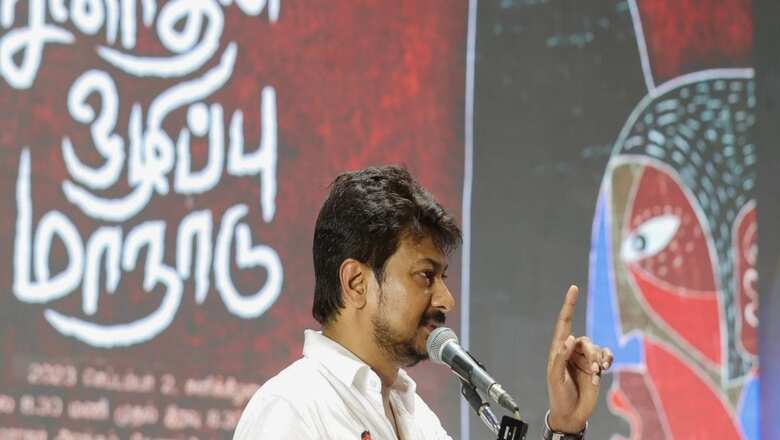
views
There is a famous saying in Sanskrit, a language Udhayanidhi Stalin and his ilk surely hate along with Sanatana Dharma: Vinash Kale Viprit Buddhi — when a person’s doom approaches, his intellect works against him. The verse, traditionally part of ‘Chanakya Niti’ or the Ethics of Chanakya, is actually the last portion of a longer shloka, which begins thus: Nobody created a deer with golden fur, nobody saw it before and nobody heard about it either. Yet, it was Lord Rama’s craving to hunt it down (upon Ma Seeta’s entreaty) which turned his intellect to work against his own interest (and ultimately led to doom in form of Ma Seeta’s abduction by Ravana).
I am citing this famous adage not just for the obvious reason. Which is that Stalin’s foolish and self-destructive remark may actually spell the start of the doom of Dravidianism in Tamil Nadu. I will come to this later. But for a subtler reason too. The saying I cited shows the capacity of Sanatana Dharma to critique one of its greatest god-heroes, Sri Rama himself. Sri Rama, too, in a moment of folly, allowed his discriminatory mind to be clouded by his attachment to his beloved wife, Ma Sita, which led to the catastrophe of her abduction by the evil genius, Ravana, and the central conflict of the Ramayana.
Of course, one can interpret this story at many levels, one of which is the Sita stands for Prakriti or the creative power of nature, which the power-hungry and lustful Asura, Ravana, wishes to appropriate to himself to enjoy dominion over creation. The Lord, out of his involvement with his own creative power, allows that to happen, albeit temporarily, in order to restore the natural order by slaying the demon-king and destroying his city of delusion. What is the lesson? Sanatana Dharma cannot be destroyed because it contains eternal truths. Also because, on a more practical level, it is capable of deep self-criticism and correction.
If Sri Rama himself can be criticised, what of self-goal of Udhayanidhi, the Stalin dynast? Yes, his remarks lack substance, understanding, or intelligence. So, ideally, they ought to be ignored. Why pay so much importance to a foolish person, who was mouthing lines written by others, whose implications he had probably not bothered to understand? But consider the worse option, what if he really meant what he said? Speaking at the Hinduphobic “Tamil Nadu Progressive Writers and Artists Association” on “Eradicate Sanatan Conference” in Chennai, Stalin, made the widely quoted and hateful remarks against Hinduism and Sanatana Dharma. The title of the conference itself should leave no doubt in peoples’ minds about what its subject could have been. Furthermore, we must bear in mind that Stalin is not only son and heir apparent of Tamil Nadu Chief Minister MK Stalin, but also currently Sports and Youth Minister and member of the state cabinet.
Despite holding such responsible positions, he is quoted as saying, “The title of this conference has been excellently coined. You’ve named it as ‘Abolish (eradicate) Sanatan Conference’ and not ‘Oppose Sanatan Conference’, so my best wishes to that.” Not stopping there, he went on in his diatribe, “Mosquitoes, dengue, flu, malaria, corona — we should not oppose these things. They’ve to be eradicated completely. The same is the case with Santanam (Hinduism). Our first work should be to abolish/eradicate Sanatanam instead of opposing it. So, my appreciation to you all for giving an apt title to the meeting.”
Stalin quickly denied that he meant the genocide of Hindus. Perhaps, he does not understand that complete eradication is equivalent to genocide? But his motive might have been the eradication not of Hindus, but their Dharma. If so, how? Through conversion to other faiths or Dravidianism? Despite all the sophistry he is capable of, Stalin’s remarks and agenda must be seen for what it is–both he and his party are openly and unabashedly anti-Hindu.
Showing how little he understood what he was criticising, Stalin asked “What is the meaning of Sanatanam?” and answered thus, “Eternal or something that can’t be changed. Something that can’t be questioned. That is the meaning of Sanatanam.” I have just shown how deeply, in a stray quotation from Chanakya Niti, Sanatana Dharma can question and correct itself. I can think, in modern times, of no better a definition than Sri Aurobindo’s in his famous Uttarpara Speech of 30 May 1909, published in Bengalee on 1 June, and revised thoroughly and republished in his journal Karmayogin in June 1909:
“We speak often of the Hindu religion, of the Sanatana Dharma, but few of us really know what that religion is. Other religions are preponderatingly religions of faith and profession, but the Sanatana Dharma is life itself; it is a thing that has not so much to be believed as lived. This is the dharma that for the salvation of humanity was cherished in the seclusion of this peninsula from of old. It is to give this religion that India is rising.”
After speaking of his spiritual experiences while in solitary confinement in the colonial jail, Sri Aurobindo goes on to say: “When it is said that India shall be great, it is the Sanatana Dharma that shall be great. When it is said that India shall expand and extend herself, it is the Sanatana Dharma that shall expand and extend itself over the world. It is for the dharma and by the dharma that India exists.”
Finally, towards the end of his speech, he gives what I consider one of the best recent expositions of the inner meaning and spiritual significance of Sanatana Dharma: “That which we call the Hindu religion is really the eternal religion, because it is the universal religion which embraces all others. If a religion is not universal, it cannot be eternal. A narrow religion, a sectarian religion, an exclusive religion can live only for a limited time and a limited purpose. This is the one religion that can triumph over materialism by including and anticipating the discoveries of science and the speculations of philosophy. It is the one religion which impresses on mankind the closeness of God to us and embraces in its compass all the possible means by which man can approach God.”
I have quoted Sri Aurobindo at length so that the shallowness and ignorance, if not wickedness, of Stalin’s distortions of Sanatana Dharma can be easily exposed. In the concluding part, we might also examine the wider political dimensions and ramifications of his remarks.
[To be concluded]
The writer is an author, columnist, and professor at Jawaharlal Nehru University. Views expressed in the above piece are personal and solely that of the author. They do not necessarily reflect News18’s views.



















Comments
0 comment